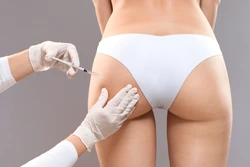
Medical Dermatology
Welcome to the Medical Dermatology Services at Cyrus Poly Clinic, where we offer comprehensive solutions for all your dermatological needs. Our team of experienced dermatologists is dedicated to providing top-tier care, utilizing the latest advancements in medical technology and research-backed treatments. Whether you're seeking treatment for acne, eczema, psoriasis, or other skin conditions, you can trust us to deliver personalized care tailored to your unique needs.
WHAT IS MEDICAL DERMATOLOGY?
Medical dermatology refers to the branch of medicine focused on diagnosing and treating conditions affecting the skin, hair, and nails. Dermatologists, who specialize in this field, are trained to address a wide range of skin conditions, from common issues like acne and eczema to more complex diseases such as skin cancer and autoimmune disorders. Medical dermatology encompasses various diagnostic techniques, medical treatments, and procedures aimed at promoting skin health and managing dermatological diseases effectively. It emphasizes evidence-based approaches to provide patients with personalized care and improve their overall well-being.
What are the Benefits and Risks of Medical Dermatology?
Benefits:
-
Accurate Diagnosis: Dermatologists are trained to accurately diagnose various skin conditions, ensuring proper treatment and management.
-
Effective Treatment: Medical dermatology offers a wide range of treatment options, including medications, topical therapies, and procedures, to effectively address skin conditions and improve quality of life.
Risks:
-
Side Effects: Some dermatological treatments may have side effects, such as irritation, dryness, or allergic reactions, which should be discussed with the dermatologist.
-
Scarring: Certain procedures, such as surgical interventions or laser treatments, carry a risk of scarring, although dermatologists take measures to minimize this risk.
-
How Much Does Medical Dermatology Cost in Dubai?
The cost of medical dermatology services in Dubai can vary depending on several factors, including the specific treatment or procedure needed, the complexity of the condition being treated, the reputation and experience of the dermatologist or dermatology clinic, and the location of the facility. Here are some approximate price ranges for common dermatological services in Dubai:
1. Consultation Fees: Consultation fees for a visit to a dermatologist typically range from AED 300 to AED 800 or more, depending on the expertise and reputation of the dermatologist and the duration of the consultation.
2. Medications: The cost of medications prescribed for dermatological conditions can vary widely depending on the type of medication, brand, dosage, and duration of treatment. Topical creams and ointments may be relatively inexpensive, while oral medications or specialized treatments may be more costly.
3. Procedures and Treatments: The cost of dermatological procedures and treatments can vary significantly depending on the type of procedure, the equipment and technology used, and the complexity of the treatment. For example:
- Laser treatments for acne scars or hair removal can range from a few hundred to several thousand dirhams per session.
- Chemical peels or microdermabrasion treatments may cost anywhere from AED 500 to AED 2000 per session.
- Surgical procedures for skin cancer removal or cosmetic enhancements can range from several thousand to tens of thousands of dirhams, depending on the extent of the procedure.
It's important for individuals seeking dermatological services in Dubai to research and compare prices, inquire about any additional fees or costs associated with treatments, and consider the reputation and expertise of the dermatologist or clinic. Additionally, patients should discuss pricing and payment options with their dermatologist or healthcare provider before undergoing any treatments or procedures.
WHAT ARE THE SIDE EFFECTS OF MEDICAL DERMATOLOGY?
Side effects of medical dermatology treatments can vary depending on the specific procedure or medication used, as well as individual factors such as skin type and medical history. Here are some potential side effects associated with various dermatological treatments:
- Topical Medications: Topical medications such as corticosteroids, retinoids, or antibiotics may cause side effects including skin irritation, dryness, redness, burning, or itching. Some individuals may also experience allergic reactions to certain ingredients in topical creams or ointments.
- Oral Medications: Oral medications prescribed for dermatological conditions may have side effects such as gastrointestinal upset, headache, dizziness, fatigue, or allergic reactions. Some medications, such as oral retinoids used for acne treatment, may also have more serious potential side effects that require careful monitoring by a healthcare provider.
- Procedures: Dermatological procedures such as laser therapy, chemical peels, microdermabrasion, or injections may cause side effects including temporary redness, swelling, bruising, itching, or discomfort at the treatment site. In rare cases, more serious complications such as infection, scarring, or changes in pigmentation may occur.
- Surgical Procedures: Surgical procedures such as skin biopsies, excisions, or Mohs surgery for skin cancer treatment carry a risk of side effects including bleeding, infection, pain, scarring, or nerve damage.
It's important for patients to discuss potential side effects with their dermatologist before undergoing any treatment, and to report any unexpected or severe reactions promptly. Dermatologists can provide guidance on managing side effects and adjusting treatment plans as needed to minimize discomfort and maximize benefits.
HOW LONG DOES MEDICAL DERMATOLOGY LAST?
The duration of medical dermatology treatments can vary widely depending on several factors, including the specific condition being treated, the chosen treatment method, and individual response to treatment. Here's a general overview:
- Acute Conditions: Some dermatological conditions, such as minor infections or allergic reactions, may require short-term treatment with medications like antibiotics or topical corticosteroids. These treatments typically last for a few days to a few weeks until symptoms improve.
- Chronic Conditions: Chronic dermatological conditions such as acne, eczema, psoriasis, or rosacea often require long-term management to control symptoms and prevent flare-ups. Treatment may involve ongoing medication use, lifestyle modifications, and regular follow-up appointments with a dermatologist. The duration of treatment can vary from months to years, depending on the individual's response to treatment and the nature of the condition.
- Procedures: Dermatological procedures such as laser therapy, chemical peels, or phototherapy may require multiple sessions spaced over several weeks or months to achieve optimal results. The duration of treatment will depend on factors such as the desired outcome, the severity of the condition, and the specific procedure being performed.
Overall, the duration of medical dermatology treatments can vary widely depending on individual factors and the specific nature of the condition being treated. It's essential for patients to work closely with their dermatologist to develop a personalized treatment plan tailored to their needs and goals. Regular follow-up appointments and communication with the dermatologist can help ensure the effectiveness and sustainability of treatment outcomes.
Are You Still Here?
Chat with us about your Concerns
Medical Dermatology FAQ
Medical dermatology addresses a wide range of skin, hair, and nail conditions, including acne, eczema, psoriasis, dermatitis, skin cancer, alopecia, and more.
Medical dermatology treatments include topical medications, oral medications, phototherapy, laser therapy, chemical peels, surgical procedures, and more, tailored to each individual's needs.
During a dermatology appointment, the dermatologist will assess your skin condition, discuss your medical history, perform a physical examination if necessary, and recommend a treatment plan based on their findings.
Latest Articles
WHY CHOOSE CYRUS POLYCLINIC FOR MEDICAL DERMATOLOGY?
Choosing Cyrus Polyclinic for medical dermatology offers several advantages:
1. Expertise: Our clinic boasts a team of experienced dermatologists who specialize in various skin conditions, ensuring that you receive expert care tailored to your needs.
2. Comprehensive Services: We offer a wide range of medical dermatology services, including diagnosis, treatment, and management of various skin, hair, and nail conditions, providing comprehensive solutions under one roof.
3. Advanced Technology: Cyrus Polyclinic is equipped with state-of-the-art medical technology and facilities, allowing us to deliver cutting-edge treatments and procedures for optimal results.
4. Personalized Care: We prioritize personalized care, taking the time to understand your concerns, goals, and medical history to develop customized treatment plans that address your unique needs.
5. Patient-Centered Approach: Our clinic is committed to patient satisfaction and comfort, providing a welcoming and supportive environment where you can feel confident and cared for throughout your dermatological journey.
When you choose Cyrus Polyclinic for medical dermatology, you can trust that you're in capable hands, receiving high-quality care that prioritizes your health and satisfaction.





